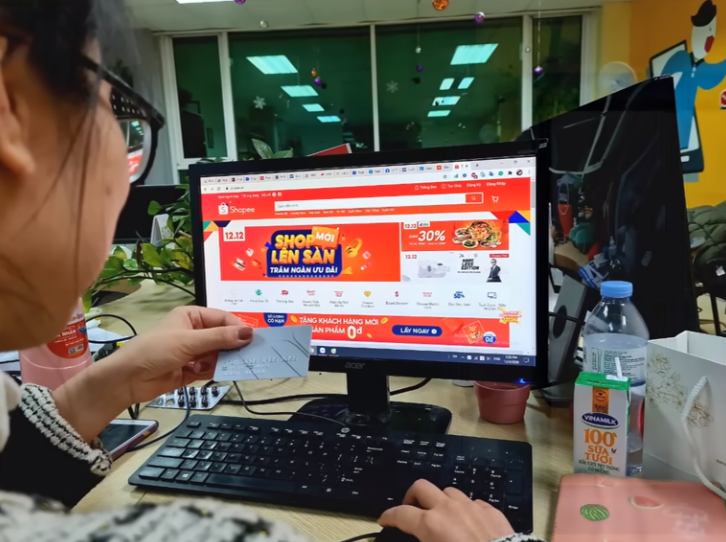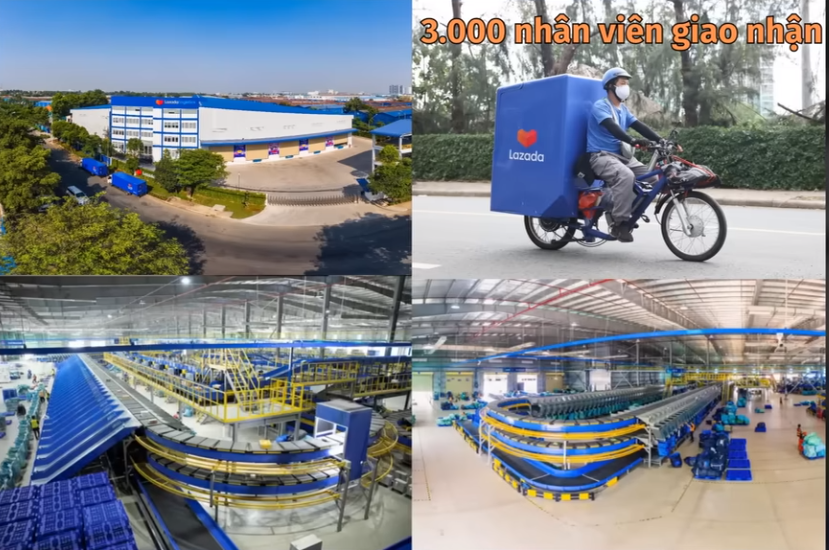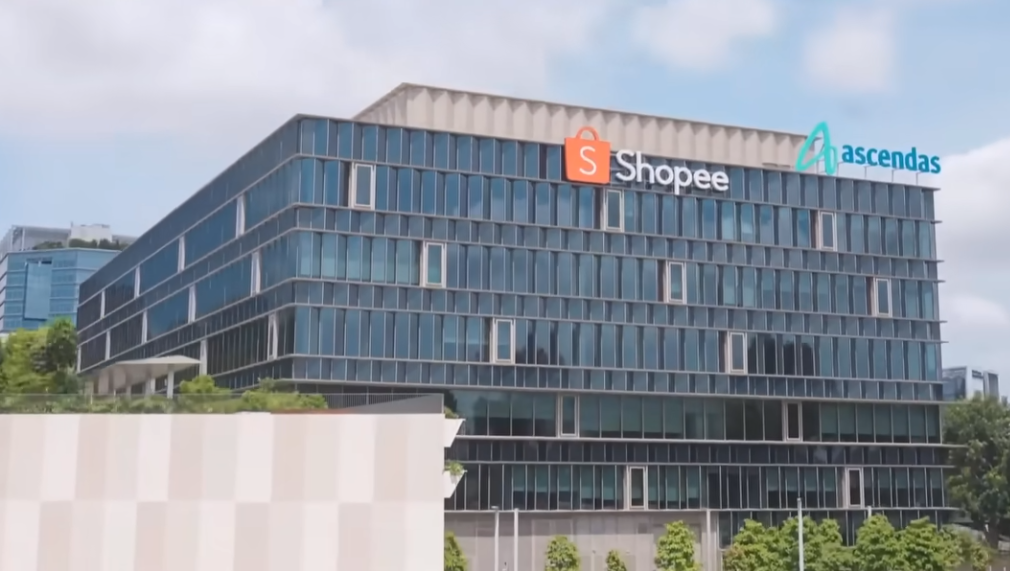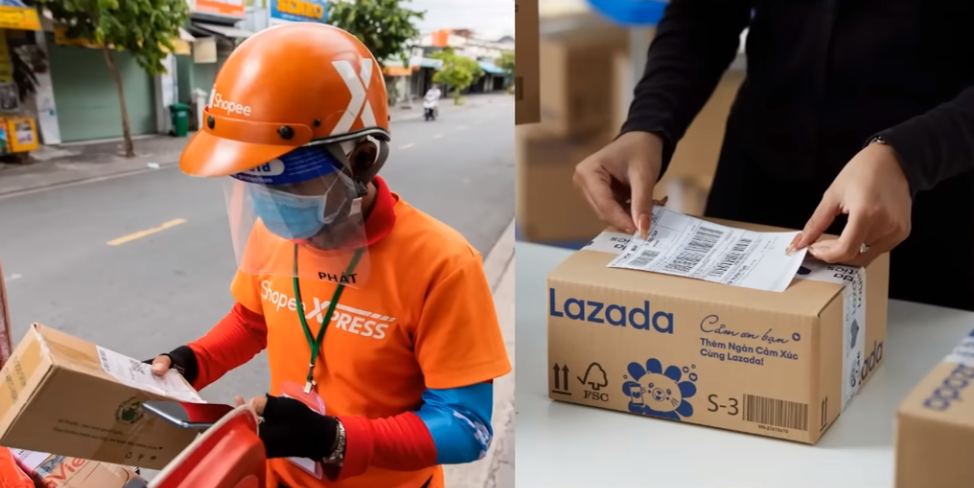In the 9 billion US dollars of transactions through the five largest multi-industry e-commerce platforms in Vietnam in 2022, 86% belonged to Shopee and Lazada. However, instead of focusing on burning money on marketing and promotions as before, both of these giants are shifting their investment heavily towards logistics. Why is this happening? Let's explore in this article.

Strong investment in Logistics
The e-commerce industry in Vietnam is assessed to have very large potential, with a total GMV of 14 billion US dollars in 2022, an increase of 26% compared to the previous year. This market is expected to grow by about 37% per year, reaching 32 billion US dollars in the next three years. With this high growth rate, Vietnam is ranked among the top 5 countries with the fastest e-commerce development globally. Over the past 10 years, many e-commerce platforms have continuously invested in promotional and discount programs; this race not only helps educate users but also drives the market to develop strongly.

In 2022, 86% of the 9 billion US dollars in transactions at the five major e-commerce platforms in Vietnam belonged to Shopee and Lazada. Specifically, Shopee accounted for 63% and Lazada 23%, while the other three platforms, Tiki, TikTok Shop, and Sen Đỏ, only accounted for 14%. This data comes from a report on e-commerce in Southeast Asia by Momentum Works, Singapore, in June 2023. At this time, when the e-commerce market is booming and online shopping has become a habit of Vietnamese people, strategies based on promotional programs and discount vouchers no longer ensure sustainable development for the platforms. Now, the top priority is to focus on technological innovation and improving operational processes, especially in the logistics sector.
According to the report on e-commerce in Vietnam in 2023, conducted by VCCI and Lazada, an efficient logistics system will become a key factor for e-commerce businesses, helping to connect the entire supply chain and enhance the buyer's experience. Currently, logistics costs in Vietnam remain high, accounting for 10 to 20% of product prices compared to about 7 to 9% in developed countries. Therefore, applying technological solutions in the delivery process will help improve performance, optimize costs for the entire system, and minimize environmental impact. Currently, Shopee and Lazada, the two giants dominating the Vietnamese market, are both focusing heavily on logistics investment.
Lazada Logistics Park

Over the past 10 years, Lazada has continuously invested in and developed advanced and stable logistics infrastructure. In Vietnam, Lazada Logistics has built a large-scale system including sorting centers, storage warehouses, and processing facilities covering more than 150,000 square meters. To date, Lazada has established sorting centers in Ho Chi Minh City and Hanoi, along with a network of hundreds of post offices across the country. Most recently, at the beginning of 2023, despite the global economy experiencing a downturn after the COVID-19 pandemic, Lazada continued to assert its position by inaugurating a sorting warehouse in the Song Than Industrial Park in Binh Duong with an investment of hundreds of billions of VND.
This new logistics center, covering an area of up to 19,000 square meters, has the capacity to handle up to 1 million parcels per day. Its modernity and advancement are demonstrated through a 99% automation system using artificial intelligence and machine learning, which helps enhance performance and optimize operations while meeting the increasing online shopping demands of Vietnamese customers. Lazada Logistics Song Than has installed an advanced conveyor system consisting of two levels capable of processing up to 45,000 parcels per hour. With this new logistics infrastructure and over 3,000 Lazada delivery staff, they can fully manage and control their delivery process. This helps them ensure service quality, improve customer experience, and reduce delivery times.
This e-commerce platform is implementing a next-day delivery program. Previously, due to the lengthy sorting process, Lazada needed to receive goods from suppliers around 14 to 15 hours, but with the new system at Lazada Park, this step can be completed around 16 to 17 hours while still ensuring timely delivery to the warehouse. Mr. Vu Duc Thinh, head of the logistics department at Lazada Vietnam, believes that the sorting center at Lazada Logistics Park is not only a new step for Lazada Logistics but also an important milestone for the logistics e-commerce industry in Vietnam.
Shopee Express

During the same period, Shopee, Lazada's top competitor, has also taken similar steps, and in early September 2023, Shopee Express expanded its sorting center in Bac Ninh, capable of processing up to 2.5 million orders per day, with plans to increase capacity to 5 million parcels a day in the next phase. The sorting efficiency at this location is impressive, with an accuracy of up to 99.97%. According to this information, this is the largest and most advanced center of Shopee Express in Southeast Asia. The new SPX center is conveniently located near National Highway 1A, situated between Gia Lam District in Hanoi and Bac Ninh Province.
With a location just 16 km from the capital, 55 km from Noi Bai Airport, and only 2 hours of travel to Hai Phong Port and Lang Son Border Gate, this center has a significant advantage in logistics operations. Choosing to place the center here allows SPX to optimally leverage the local potential, where there is a top-notch warehouse system and transportation services, along with geographical advantages close to Hanoi, Hai Phong Port, and existing infrastructure, helping SPX enhance and expand its network. For a unit specializing in delivery services like SPX, having a strategic transaction point like this facilitates the distribution and circulation of goods, making it easy to move along various routes in the area or across borders by both road and air.
Advanced technologies are being implemented at the SPX Bac Ninh center, including an automated conveyor system, direct transfer of goods from trucks, and an automated matrix sorting area, measuring the dimensions and weight of goods with six-dimensional cameras, a high-tech sorting area with an accuracy of 99.97%, and an automated receiving and shipping system. All these technologies ensure that the sorting process of goods occurs quickly, accurately, and to the highest standards. Ms. Nguyen Kim Anh, director of SPX, stated that the launch of the Bac Ninh sorting center is a memorable milestone in SPX's development journey. The goal of this new center is to meet the increasingly high demands from the e-commerce market and the digital economy, while also connecting consumers with sellers and brands more quickly, safely, and reliably.
Price pressure on last-mile delivery companies
Leading e-commerce platforms like Shopee and Lazada, by focusing on expanding logistics services and building partnerships, have created price pressure on delivery and express courier companies. Both platforms have developed thousands of drop-off points through partners, along with hundreds of pick-up points and a system of smart lockers, facilitating smooth and quick deliveries to millions of customers nationwide.

A recent report on the last-mile logistics market in Southeast Asia by Mr. Truong Bui, general director of Roland Berger Vietnam, indicates that the transformation in this field will mainly rely on the development of the e-commerce market, the speed of urbanization, and the increasing income of consumers. These factors will drive the demand for home delivery. The delivery and express courier market in Southeast Asia may face pressure from a price competition similar to that in China in recent times.
Mr. Truong Bui predicts that the last-mile logistics market in Southeast Asia will adopt many new technologies such as smart lockers for deliveries, trend analysis to predict demand, expanding delivery routes, and integrating drones and automated delivery vehicles. Changes in demand and market orientation are pushing businesses in this field to reconsider their services, and expanding operations across the entire value chain is becoming a common trend, according to Mr. Bui.
